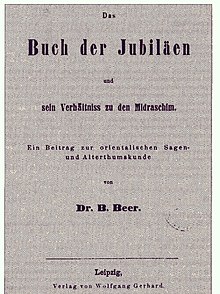
Back Boek van Jubileë Afrikaans መጽሐፈ ኩፋሌ Amharic كتاب اليوبيلات Arabic كتاب اليوبيلات ARZ Knjiga jubileja BS Llibre dels Jubileus Catalan Kniha jubileí Czech Buch der Jubiläen German Βιβλίο των Ιωβηλαίων Greek Libro de la Jubileoj Esperanto
 | |||||
| Tanakh (Judaism) | |||||
|---|---|---|---|---|---|
|
|
|||||
| Old Testament (Christianity) | |||||
|
|
|||||
| Bible portal | |||||

The Book of Jubilees[a] is an ancient Jewish apocryphal text of 50 chapters (1,341 verses), considered canonical by the Ethiopian Orthodox Tewahedo Church, as well as by Beta Israel (Ethiopian Jews). Jubilees is considered one of the pseudepigrapha by the Eastern Orthodox, Catholic, and Protestant churches.[1] Apart from the Beta Israel community, the book is not considered canonical within any of the denominations of Judaism.
It was well known to early Christians, as evidenced by the writings of Epiphanius, Justin Martyr, Origen, Diodorus of Tarsus, Isidore of Alexandria, Isidore of Seville, Eutychius of Alexandria, John Malalas, George Syncellus, and George Kedrenos. The text was also utilized by the community that collected the Dead Sea Scrolls. No complete Hebrew, Greek or Latin version is known to have survived, but the Geʽez version is an accurate translation of the fragments in Biblical Hebrew found in the Dead Sea Scrolls.
The Book of Jubilees presents a "history of the division of the days of the law and of the testimony, of the events of the years, of their (year) weeks, of their jubilees throughout all the years of the world, as the Lord spoke to Moses on Mount Sinai when he went up to receive the tables of the law and of the commandment"[2] as revealed to Moses (in addition to the Torah or "Instruction") by angels while he was on Mount Sinai for forty days and forty nights.[3] The chronology given in Jubilees is based on multiples of seven. The jubilee year is the year that follows the passage of seven "weeks of years" (seven cycles of sabbatical years, or 49 total years), into which all of time has been divided.
Cite error: There are <ref group=lower-alpha> tags or {{efn}} templates on this page, but the references will not show without a {{reflist|group=lower-alpha}} template or {{notelist}} template (see the help page).
- ^ Harris, Stephen L., Understanding the Bible. Palo Alto: Mayfield. 1985.
- ^ "Book of Jubilees 1:1". www.sefaria.org.
- ^ "Jubilees 1". www.pseudepigrapha.com.